Curating Cinema: Redefining the Role of Programming in Film Festivals
The inaugural School of Arts and Aesthetics Film Festival (SAAFF), was organized by the School of Arts and Aesthetics (SAA), Jawaharlal Nehru University, in collaboration with the Mumbai Academy of Moving Image (MAMI) Mumbai Film Festival between 26 - 28 April, 2024. The festival brought together a slate of emerging and established feature and short films to the university. Along with its film programming, the festival featured a panel discussion titled ‘Indian Cinema and the Film Festival Ecosystem in India’. The panel brought together distinguished programmers from across the nation, including Raman Chawla, Programmer and Festival Organiser at El Gouna Film Festival (Egypt); Deepti Dcunha, Artistic Director of MAMI Mumbai Film Festival; Svetlana Naudiyal, Programming Director for MUBI in the Asia-Pacific region; and Prateek Rawat, Lead Film Programmer focusing on International Cinema at the National Film Development Corporation of India (NFDC).
The session was moderated by Veena Hariharan, Associate Professor at SAA. Opening the discussion on film festivals and the challenges of film programming and curation, Hariharan posed some fundamental questions to the panelists, around their journey, navigating the relatively niche field of film programming to achieve both international and national recognition. She inquired about the challenges they faced entering the industry and sustaining competitiveness, particularly in terms of financial support during the early stages of their careers. Additionally, Hariharan asked about the significance of networking, passion, and strategic learning in shaping the panelists’ professional trajectories within the film festival ecosystem.
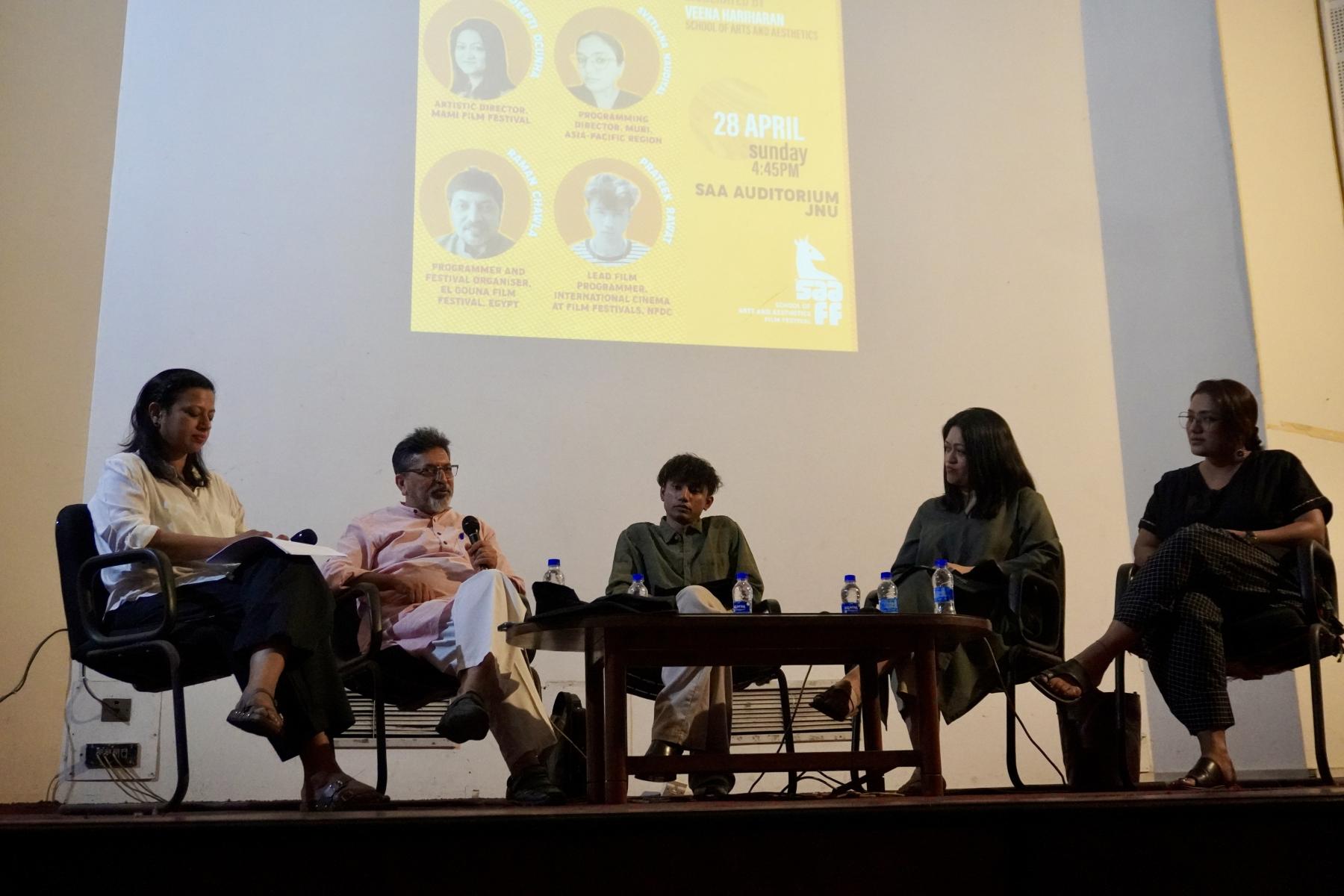
Hariharan further delved into the inherent difficulties of entering and sustaining a career in film programming, acknowledging its specialized nature and relatively small professional circle and eventually attaining prominence in global curation.
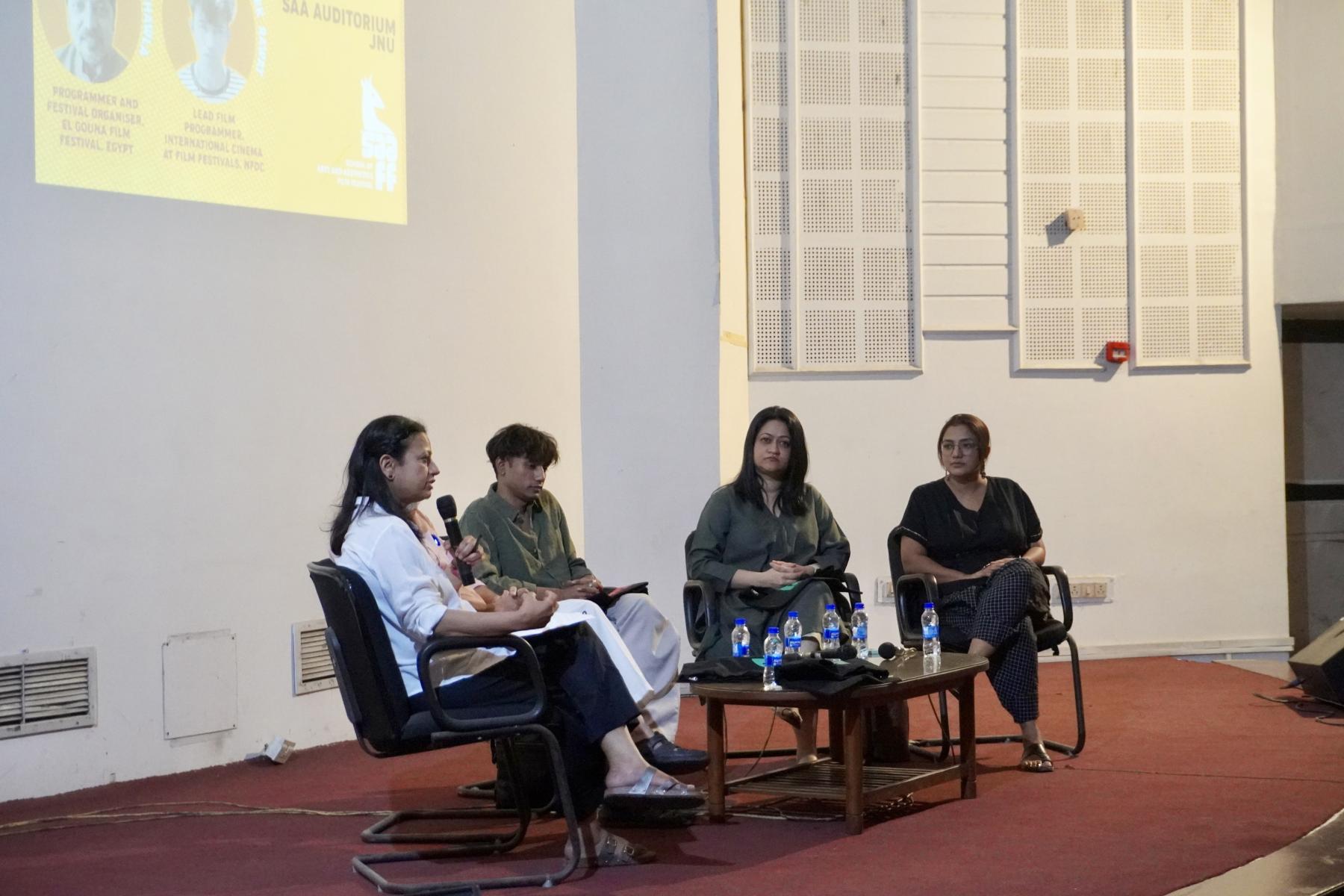
Raman Chawla began the conversation by talking about his unexpected journey into festival programming while pursuing studies of the French language for travel and tourism. Through a twist of fate, he found himself assisting French film crews visiting India, leveraging his language skills to facilitate their shoots. This role led him into the vibrant world of cinema, specifically through his involvement with the film and television department of the French embassy in India. Chawla was introduced to a treasure trove of classic French films, fostering a deep appreciation for cinema. Over a decade, he nurtured connections with India's film societies, educational institutions, and festivals, laying the groundwork for their future in the industry. This path eventually led to film production, where he spent a decade honing the craft.
Chawla mentioned how attending film festivals became a cherished ritual, offering a unique experience of cinematic immersion and community engagement. The turning point came during a sweltering day at a festival, where he endured a 45-minute queue for a Wong Kar Wai screening, sparking a determination to contribute to festivals from within. Despite encountering skepticism around obtaining sponsorship due to concerns about potential compromises in artistic integrity, Chawla remained committed to enhancing the festival experience through his unique background and passion for cinema.
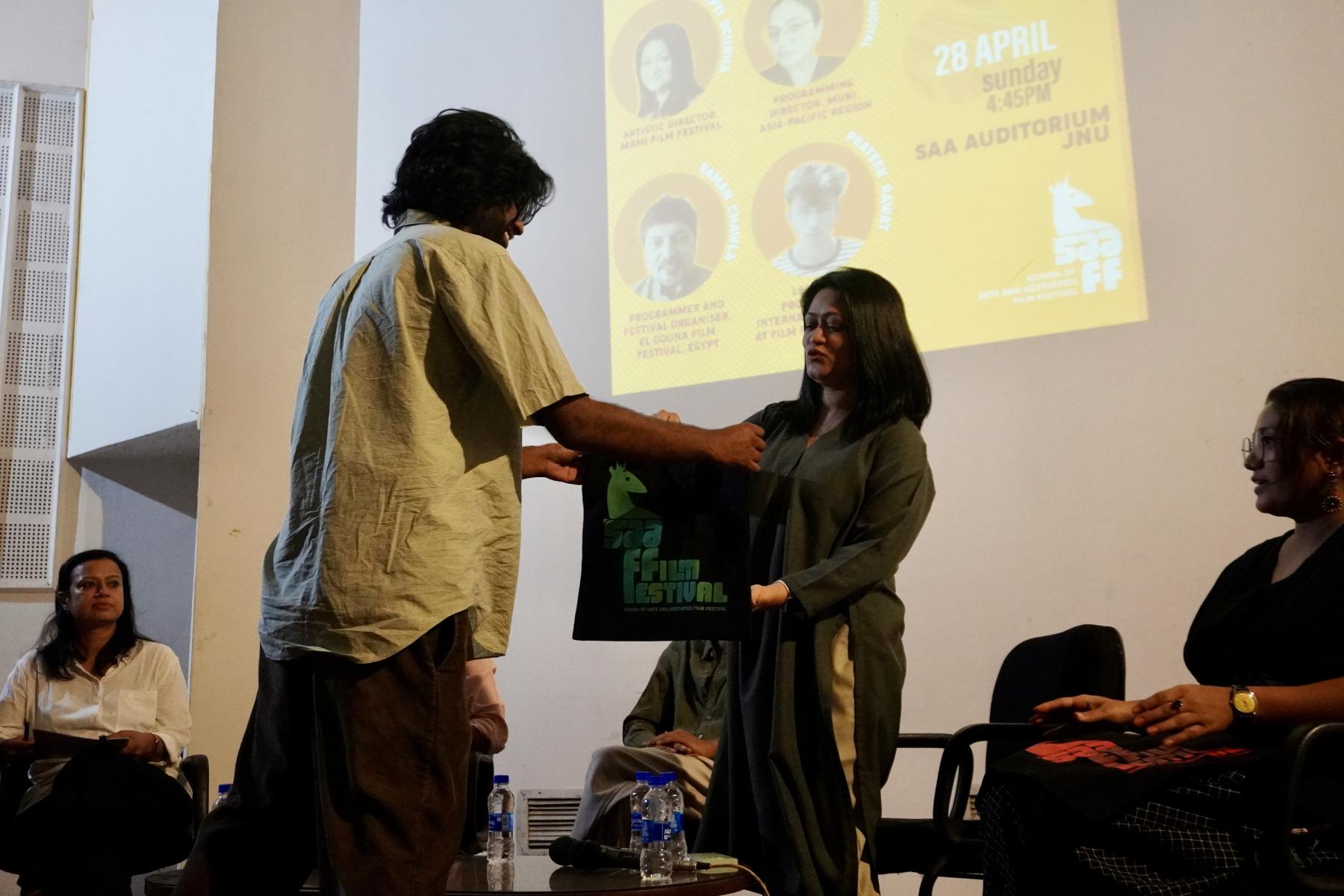
As the artistic director of MAMI, arguably one of the more prominent national film festivals in India, Hariharan implored Dcunha to speak about her role within the broader context of film programming in the country, as well as the existing infrastructures for curation and festivals.
Dcunha reflected on her involvement in the film bazaar, attributing it’s genesis to Nina Lath Gupta's vision within NFDC, which aimed at enhancing the producer's role and fostering co-productions in India. Her specific contribution to NFDC’s Film Bazaar was by establishing "the viewing room," drawing from her early exposure to world cinema at the Katha Centre for Film Studies.
Dcunha’s involvement in the field developed further during her tenure at Osian's Cinefan, where encounters with emerging directors and seasoned veterans like Mani Kaul and his visionary approach to cinema profoundly influenced her perspective on film programming. This period laid the groundwork for Dcunha’s subsequent collaborations with Marco Mueller from the Venice Film Festival, which facilitated collaborations between Indian filmmakers and global platforms. Her role extended to curating significant sections of Film Bazaar like "Newstream Cinema," emphasizing the intersection of mainstream, independent and arthouse cinema. Notably, Dcunha’s involvement led to her programming "Film Bazaar Recommends," and the "Work in Progress Lab," aimed at refining Indian films for international exposure. This process involved getting feedback from international programmers and editors, contributing to the success of acclaimed films like Ram Reddy’s Thithi (2015) at prestigious festivals like the Locarno Film Festival. Alongside programming for MAMI, Dcunha’s work enables her to promote Indian cinema through a commitment to nurturing local talent and asserting India's cinematic identity on the global stage. This multifaceted engagement reinforces her passion for discovering and promoting Indian filmmakers, reducing dependence on external validation for recognizing local talent.

Hariharan then acknowledged Prateek Rawat’s role in a similar realm of film curation and programming. Rawat began his journey into film programming almost serendipitously while pursuing his academic interests. During his master's studies, he realized his passion for films and contemplated alternative career paths beyond academia. This realization led him to volunteer at the Dharamshala International Film Festival (DIFF) which provided a behind-the-scenes perspective that was both illuminating and exhilarating.
Through his subsequent experiences at other film festivals and organizations, Rawat delved deeper into the world of film curation, embracing the challenges and dynamism of festival management, navigating tight schedules, limited resources, and the intricacies of film selection. His involvement extended to diverse roles, from coordinating events and managing submissions to programming world cinema and experimental film sections. Rawat has previously worked with renowned institutions like Osian's and collaborated with cultural organizations such as the Japan Foundation, the Japanese embassy’s cultural wing in India. Rawat conducted archival research, studied audience preferences and trends across different regions of India, and shed light on emerging subcultures, such as the growing interest in Japanese cinema amongst Indian audiences.
A pivotal moment for Rawat’s career came with his involvement in major festivals like the International Film Festival of India (IFFI), Goa. He navigated the complex challenges, around festival transitions and government-backed initiatives, which underscored the nuanced dynamics of programming for such events. Rawat’s tenure at IFFI exemplified his dedication to showcasing diverse cinema and fostering emerging talent. Rawat stated that he has prioritized innovative programming choices, advocating for gender representation and diversity in film selections. His approach emphasized discovering new voices and pushing boundaries through curated sections like world cinema and experimental film showcases.

Hariharan then sought to understand how Svetlana Naudiyal’s work with MUBI, which involves curating content on a platform that is in significant contrast to algorithm-driven giants like Netflix and Amazon Prime, has shaped her perspective on the intersection of content curation and algorithmic influence in the streaming landscape. Naudiyal began by recounting her internship at IFFI, which unexpectedly led her into the world of film organization. Originally aspiring to be a copywriter, she ventured into film studies during a course at IIMC (Indian Institute of Mass Communication) and secured an internship during the national awards. Subsequently, she joined the Katha Center for Film Studies as a research assistant for a film curation program, which proved to be a transformative learning experience under the guidance of Prabodh Parekh. Later, she transitioned to NFDC (National Film Development Corporation), facilitated by Dcunha, and embarked on a diverse career trajectory, working across various departments and roles at Film Bazaar.
Her tenure at NFDC encompassed tasks ranging from festival operations to promoting NFDC productions internationally, despite initial monetary challenges. Following NFDC, she briefly contributed to MAMI (Mumbai Film Festival), focusing on operational aspects during the festival and managing year-round screenings.
Naudiyal’s journey further extended to Soho House, where she organized private screenings in a member-exclusive theater, allowing greater freedom in film selection and filmmaker interactions due to the private setting. At MUBI, she stated, her role in programming films aligned with the platform's vision of bringing niche cinema to audiences while adapting to evolving trends in the industry.
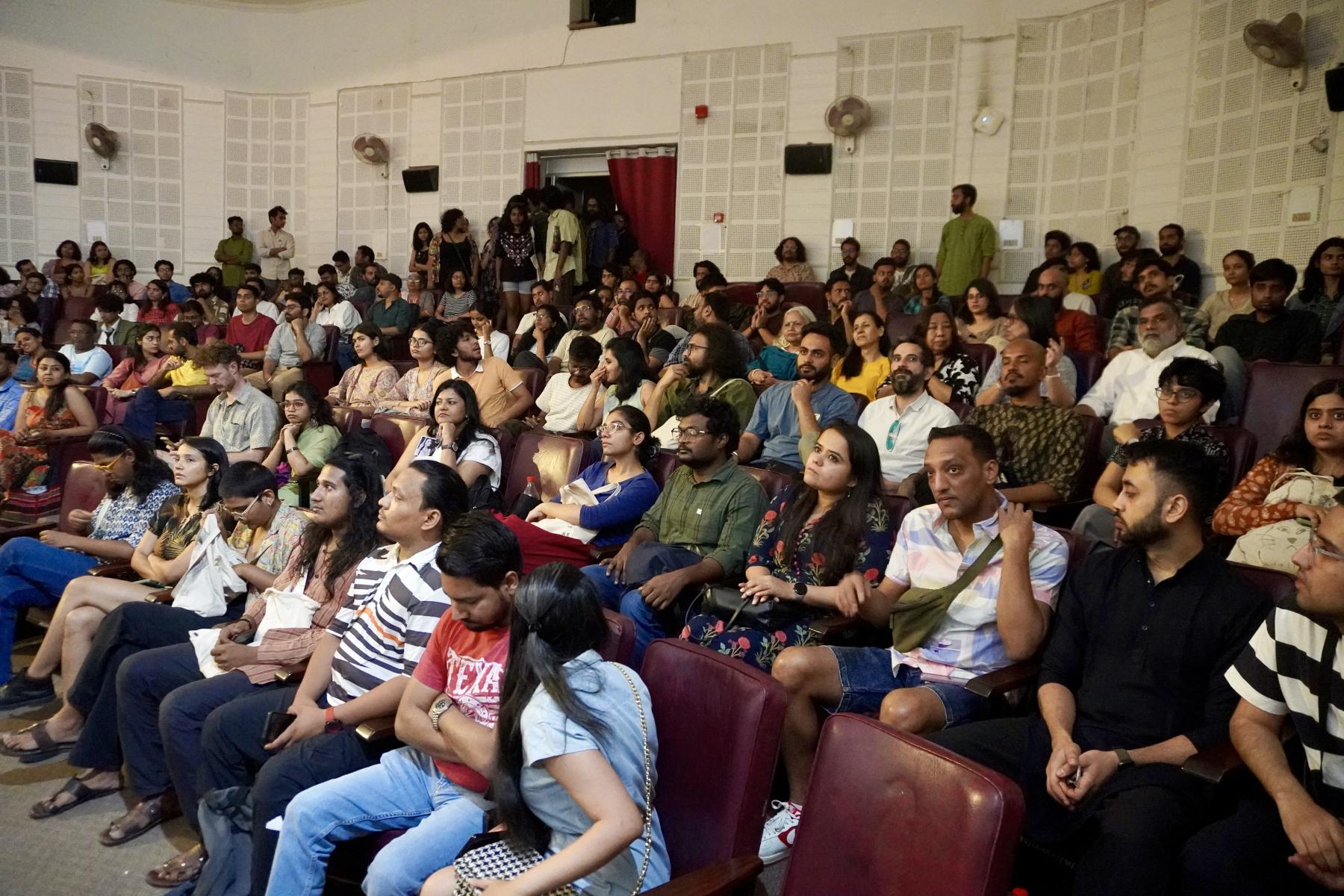
The panel encapsulated the nuanced journeys and strategies of film programmers and curators navigating the dynamic film festival ecosystem and shed light on the evolving intersection of curation and technology, challenging traditional paradigms of content dissemination. Some of the questions to the panelists revolved around the curator’s responsibility and potential doubts when choosing one film or filmmaker over another, considering the possibility that the unselected option might have been the better choice.
The speakers responded by emphasizing the instinctual and subjective nature of film curation. They highlighted the responsibility of a curator to trust their instincts and share films they truly love. They acknowledged that while every film deserves a platform, the selection process is inherently unfair and subjective, often influenced by factors like screen time, audience, and festival criteria. The speakers also acknowledged the challenges of curating films from cultures they may not fully understand, emphasizing the need for sensitivity, education and objectivity. They also pointed out the pressures from audiences and filmmakers, who may react negatively to their choices. Ultimately, they agreed that while curating is difficult and sometimes contentious, it remains a deeply rewarding and instinct-driven process. The discussion emphasized on the transformative potential of curatorial expertise in fostering inclusivity, discovery, and cultural dialogue within film festivals and underscored broader themes of innovation, adaptability, and the imperative for diverse representation within film curation.
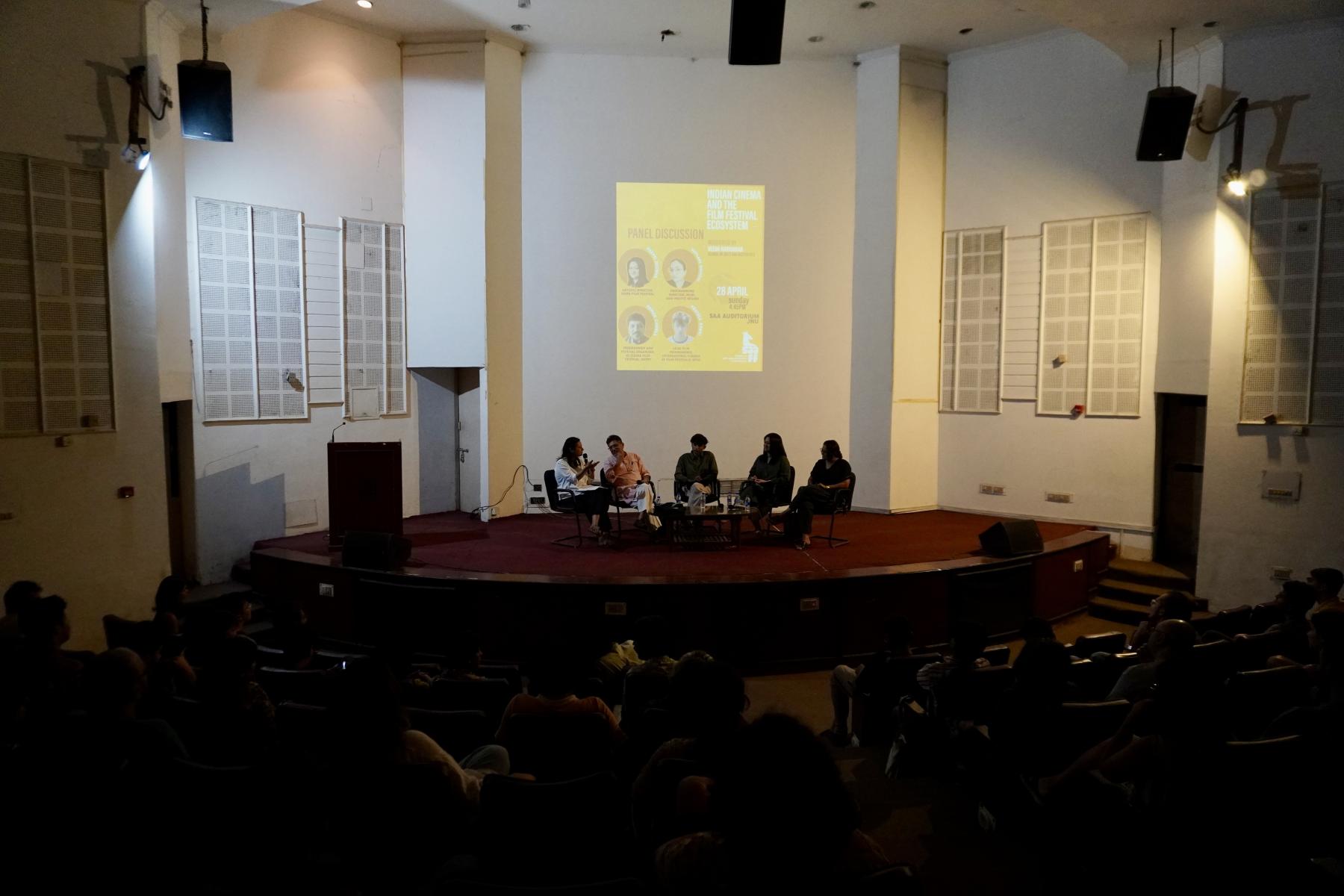
To read more about ongoing conversations with curating in South Asia, read Anoushkha Prasad’s report from the Anant Curatorial Forum, Sukanya Baskar’s interview with Tanvi Mishra on curating photographic practices from South Asia and Ankan Kazi’s essay on Zoe Butt’s lecture-performance.
All images from the panel discussion ‘Indian Cinema and the Film Festival Ecosystem in India’, School of Arts and Aesthetics (SAA, JNU). Images courtesy of the School of Arts and Aesthetics, JNU.




